update 29.
our difficulties drag on
Cycling in southern Ethiopia
21 November 2008
Total kilometers cycled: 44,485
Specific country info on routes & roads/food & accommodation/the locals available here.
Few travelers enter Ethiopia at the Todonyang-Omorate border crossing. There are several factors that might put off would-be voyagers. Waring tribes for one. Lack of a proper road on the Kenyan side is surely another. But the main reason people use alternative routes between the two countries is the Omo river. And the fact that no one has gotten around to building a bridge across its murky waters.The tribal people inhabiting the 30 kilometer stretch of land between Kenya's last military outpost and the Omo river in Ethiopia exist in a world of their own. The local Dasanech people's homes are made of pliable wood fashioned into crude igloo-like dwellings. Women are mostly bare-breasted, men are almost always armed with a rifle or spear and many sport
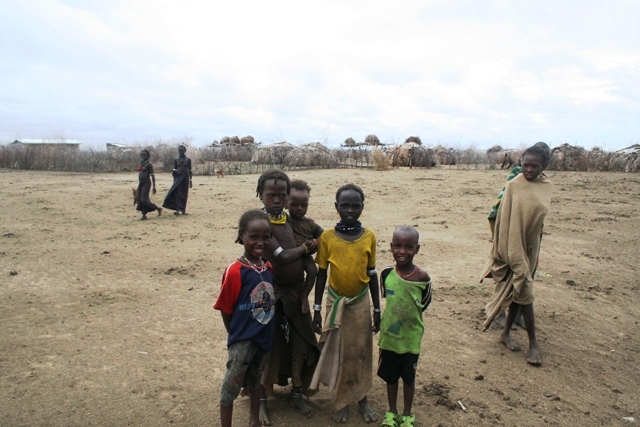
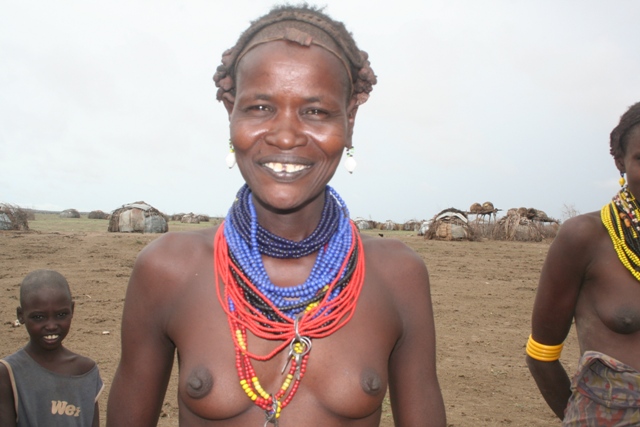
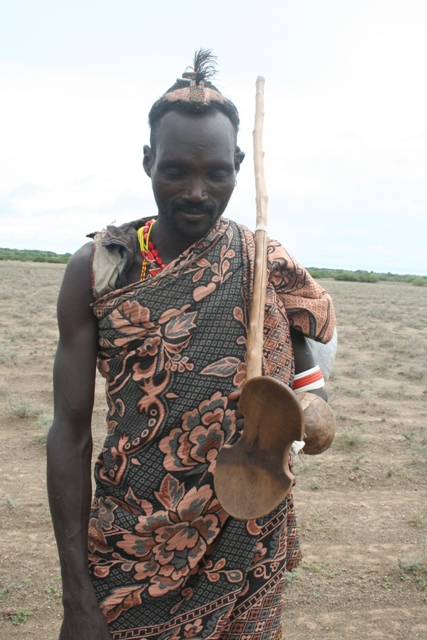
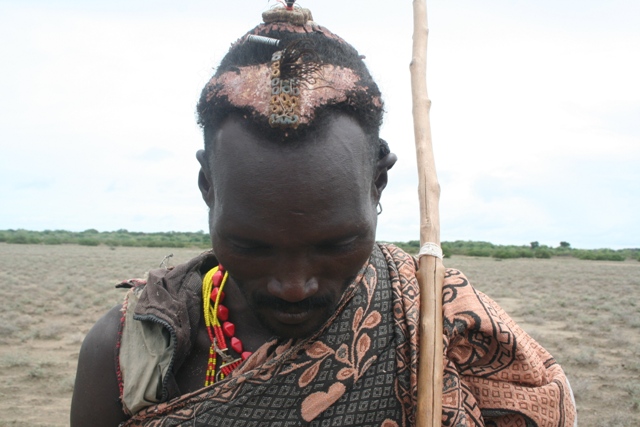
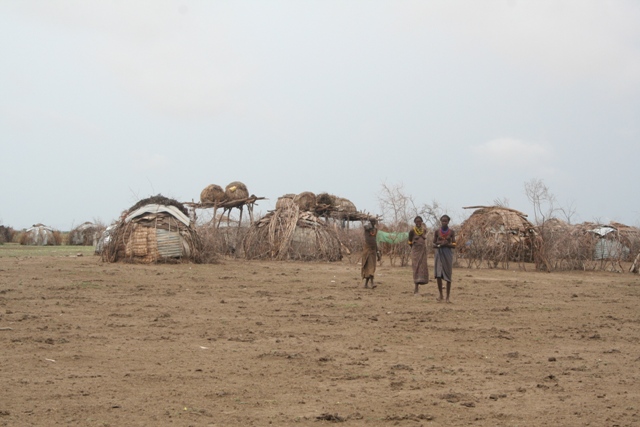
elaborate hair styled with mud and adorned with feathers. Apparently this signifies a man has recently killed an enemy or large animal. The tribal people we met were not unfriendly, but we felt as though we were somehow invading their privacy by traversing their lands. Their world is so far-removed from any existence I am familiar with, that I was left feeling both fascinated and somehow fearful. I certainly would not have felt comfortable asking the local chief for a spot to pitch the tent for the night. At one point, though, it seemed as if that was exactly what we would be forced to do.
Heavy rains had been battering the lower Omo Valley for the better part of a week. The soft sand typical of the track around Lake Turkana had suddenly turned into mushy mud. The path had become a squishy, squashy, squelchy marshland that easily sucked in our unwieldy bikes. We were stuck.
That certainly wasn't the first time we'd had to deal with mud. The roads in Gabon and the Congo were awash with the bothersome substance. Our only coping strategy was to search for a stick suitable for poking and prodding, eventually freeing the wheel so we could ride, well at least, push the bikes further. This poking, prodding and pushing routine went on for some time, to the great amusement of the locals who gathered to snicker at the silly tourists and their foolish means of transport.
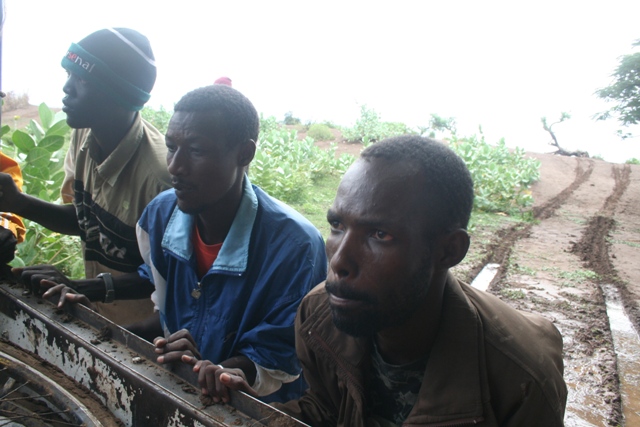 When
we had set off in the morning, the 50 kilometer ride to the town of
Omorate had certainly seemed feasible. Now
our chances of reaching the town looked to be about nil. We'd
seen just one vehicle that day. Everyone was either on foot or
astride a donkey.There's no bridge or ferry linking Ethiopia and
Kenya at
the Omo river, so there's little reason for vehicles to pass that
particular stretch of road since it's a dead end of sorts. In
fact the border is used so
infrequently that there are no immigration facilities. We had to
get our exit stamp in Nairobi, giving them an estimate of the date
we were likely to leave Kenya.
When
we had set off in the morning, the 50 kilometer ride to the town of
Omorate had certainly seemed feasible. Now
our chances of reaching the town looked to be about nil. We'd
seen just one vehicle that day. Everyone was either on foot or
astride a donkey.There's no bridge or ferry linking Ethiopia and
Kenya at
the Omo river, so there's little reason for vehicles to pass that
particular stretch of road since it's a dead end of sorts. In
fact the border is used so
infrequently that there are no immigration facilities. We had to
get our exit stamp in Nairobi, giving them an estimate of the date
we were likely to leave Kenya. We had almost resigned ourselves to a night in the bush being stared at by the curious and well-armed tribes people when I spotted a vehicle fishtailing its way down the track. Eric and I waved our arms frantically and the overburdened Land Rover pick-up came to a halt. The truck bed was sinking conspicuously under the weight of its ten or so passengers piled high atop crates of cooking oil and long-life milk destined for the market over the river. I personally didn't think there was room for us. But it was November 5th and the traders (all Kenyans) were euphoric after Barrack Obama's victory in the US elections. 'A kenyan boy is president of America,' they whooped and hollered to whoever would listen. When I mentioned I was American they eagerly made space for madam, but almost left Eric behind when he grumbled about the 500 shilling ($6) charge for the 12 kilometer lift to the river.
The pickup was airborne for much of the journey as Abdullah (the driver, although the others referred to him as the pilot which was probably a more apt description of what he was doing) bounced and skidded the vehicle across the slippery track. In many places small lakes of water had accumulated. Our pilot Abdullah would bring the Landy to a stop, get out do to a bit of reconnaissance, rev the engine and then hit the accelerator. I held on tight as the truck bed was almost submerged by muddy water and breathed a sigh of relief as we made it safely to the other side. Then there was more bouncing and lots of gasps and yelps from Eric and me. The Kenyans all put on far more stoic faces and took the jolting and jarring in stride. Just before arrival at the river, the Land Rover got completely bogged down in the mud, and despite the men's valiant efforts to dislodge it, we were definitively stuck. Thankfully we weren't far and, like a queen in colonial times, I was carried to the river's shore to await transport to the other side.
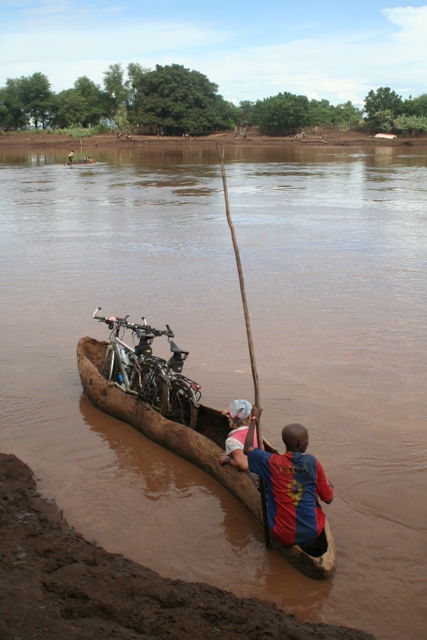 On the riverbank, there was much excitement as all the boatmen vied for the faranji's business.
Finally we settled on a price and I was loaded into one of the
precarious dugout canoes along with the two bicycles. Eric would
follow with our bags in another canoe. 'Keep the balance, madam!' Abdullah advised.
On the riverbank, there was much excitement as all the boatmen vied for the faranji's business.
Finally we settled on a price and I was loaded into one of the
precarious dugout canoes along with the two bicycles. Eric would
follow with our bags in another canoe. 'Keep the balance, madam!' Abdullah advised.Right. What kind of advice was that? The oarsman and I hadn't even left shore and already we were wobbling dangerously from side to side.
I wasn't really worried about drowning since the river was relatively narrow at this point and the current didn't appear to be too strong. But the bikes would surely sink to the bottom of the Omo River if we were to capsize. And with our now top-heavy canoe, capsizing seemed not too far-fetched a possibility.
Just as we were setting off there was a great commotion on shore and the young man in whose hands I had entrusted my most precious possession slowly poled back to shore.
On shore a young dreadlocked guide was wringing his hands and shaking his head in disbelief. 'No.no.no. You can't possibly make it across the river like that.'
And I rather suspected he was right.
Stephen, as he introduced himself, sorted us and our gear out into three dugout canoes and eventually we made it across safely. We were very thankful that he had come along when he did, because our good sense was obviously failing us.
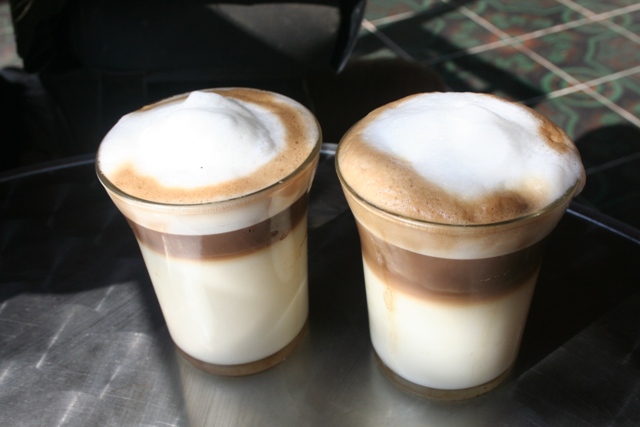 Omorate consisted of one muddy track lined with small shops selling a selection of cheap Made in China goods
and qat houses. Qat is the highly-addictive leaf that is chewed
throughout Ethiopia. It has a mildly intoxicating effect (I'm
told) and also acts as a hunger suppressant. We didn't try the
qat, but we did take the opportunity to enjoy some delicious Ethiopian
coffee. A real pleasure. Macchiato, cappuccino and
espresso can be found in even the smallest of towns and are as
good as those made in fancy European cafes. And at about 2 birr
(20 cents) we can indulge several times a day without worrying about
the budget.
Omorate consisted of one muddy track lined with small shops selling a selection of cheap Made in China goods
and qat houses. Qat is the highly-addictive leaf that is chewed
throughout Ethiopia. It has a mildly intoxicating effect (I'm
told) and also acts as a hunger suppressant. We didn't try the
qat, but we did take the opportunity to enjoy some delicious Ethiopian
coffee. A real pleasure. Macchiato, cappuccino and
espresso can be found in even the smallest of towns and are as
good as those made in fancy European cafes. And at about 2 birr
(20 cents) we can indulge several times a day without worrying about
the budget.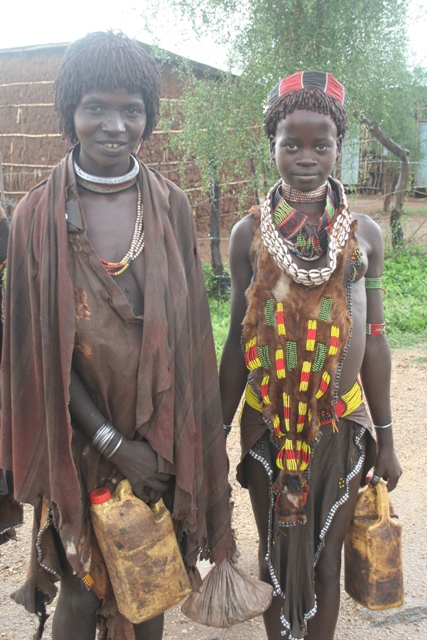 From
Omorate we made our way further north through the Omo Valley passing
through small villages inhabited by people of the colorful Hamer
tribe. Tribes people dress in animal skins and wear iron coils around
their arms and bright beaded jewelery. This is a fascinating part of
Ethiopia, but tourism has left its mark. Locals persistently
asked to be photographed and then expected to collect their fee of 1 or 2
birr per shot. Of course they should benefit from tourism and
it's understandable that they should want money from the stream of
foreigners on expensive day trips who buzz by in 4WDs to snap their
photos. But for us, we prefer more 'authentic' exchanges with the
local people.
From
Omorate we made our way further north through the Omo Valley passing
through small villages inhabited by people of the colorful Hamer
tribe. Tribes people dress in animal skins and wear iron coils around
their arms and bright beaded jewelery. This is a fascinating part of
Ethiopia, but tourism has left its mark. Locals persistently
asked to be photographed and then expected to collect their fee of 1 or 2
birr per shot. Of course they should benefit from tourism and
it's understandable that they should want money from the stream of
foreigners on expensive day trips who buzz by in 4WDs to snap their
photos. But for us, we prefer more 'authentic' exchanges with the
local people. 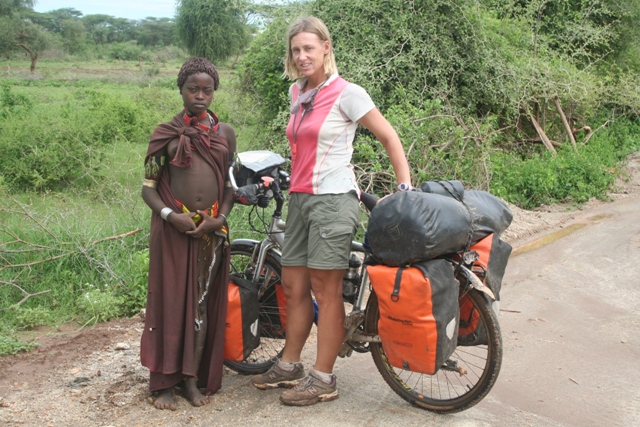
You're probably tiring of our tales of almost impassable roads, but a few more trials were still in store for us. The unseasonable rains hadn't let up, and we almost found ourselves marooned in a place called Turmi. We'd been racing a storm to arrive in Turmi, but just 4 kilometers out of town the clouds burst and the rain came pelting down in buckets. We tried to take cover under a thorn tree, but of course it provided little protection. The temperature dropped rapidly and within minutes we were drenched and shivering. We could see huge pools of water forming rapidly and we knew that the area was known for flash floods and there was a real risk of being cut off from the town. We made the decision to get back on the bikes. The track was muddy and the going was slow, but the real problem was the small rivers that were already crisscrossing the road. In three spots of the short stretch of road, the water had already risen to such a high level that we were forced to take off the saddle bags and carry the bikes across th flooded section. Never have I seen so much rain fall in such a short period of time.
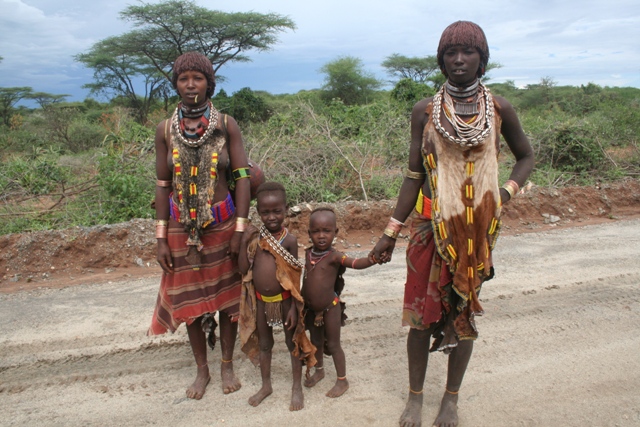 Once
we arrived in Turmi the rain stopped, and as our teeth chattered over a
cup of tea we asked the locals about the road ahead. We were told
there was now a large gap in the road due damage caused by the heavy rains and that
two days earlier a vehicle owned by a group of Italians had been swept
away by the current in a river that had formed over the road. No
deaths, apparently, as everyone had had the good sense to leave the
truck.
Once
we arrived in Turmi the rain stopped, and as our teeth chattered over a
cup of tea we asked the locals about the road ahead. We were told
there was now a large gap in the road due damage caused by the heavy rains and that
two days earlier a vehicle owned by a group of Italians had been swept
away by the current in a river that had formed over the road. No
deaths, apparently, as everyone had had the good sense to leave the
truck. We would have to take an alternative route over a rough track passing through the villages of Dimeka and Key Afer. Since it was only 30 kilometers away and the road was in reasonable shape (only one small un-bridged river to cross), we made it to Dimeka
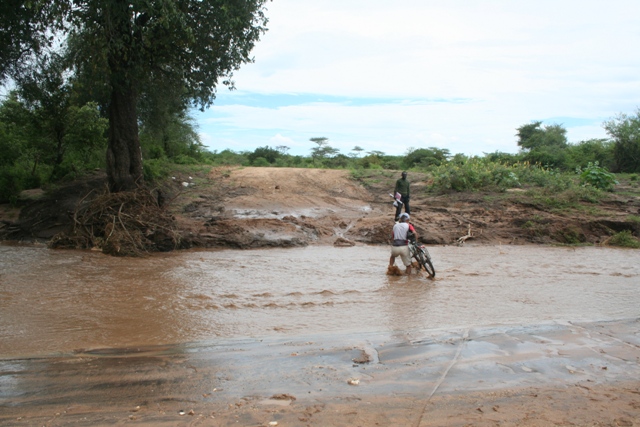 easily
enough. It was Friday, a day when Ethiopians traditionally
eat vegetarian food, and we had a fine meal of injera, spicy
sauces and vegetables in the local restaurant. Injera is
the Ethiopian staple and we've grown quite fond of it. It's
made of fermented tef and is something like a sourdough pancake.
It's soft and spongy and makes a nice change from rice
and beans. After lunch we went to the Bunna Bet (coffee house)
for macchiatos and then headed straight to the Catholic Mission.
There we were warmly welcomed by the ever-smiling Father Paddy
from Ireland.
easily
enough. It was Friday, a day when Ethiopians traditionally
eat vegetarian food, and we had a fine meal of injera, spicy
sauces and vegetables in the local restaurant. Injera is
the Ethiopian staple and we've grown quite fond of it. It's
made of fermented tef and is something like a sourdough pancake.
It's soft and spongy and makes a nice change from rice
and beans. After lunch we went to the Bunna Bet (coffee house)
for macchiatos and then headed straight to the Catholic Mission.
There we were warmly welcomed by the ever-smiling Father Paddy
from Ireland. The good Father is a wonderfully energetic man who operates a kindergarten, nutritional program, computer courses and vocational training center and still has time to make two cyclists who appear from out of the blue feel right at home. In the night the rains began again and over breakfast the next morning, Father Paddy suggested we take a lift on one of the church's vehicles that was leaving that day. The road would only get worse he told us. The offer certainly was tempting. Our food supplies were dwindling and we had very little petrol left for our stove and it seemed impossible to find any in that remote area. We'd scoured the markets in the small towns we'd passed, but the only fuel available was diesel. The next petrol station was in Konso some 150 kilometers away. Given the state of the road it might take us several hard days of cycling/heaving/pushing to reach the town. The continuing battle with the roads had left us exhausted and the thought of reaching tarmac within hours instead of days was enticing.
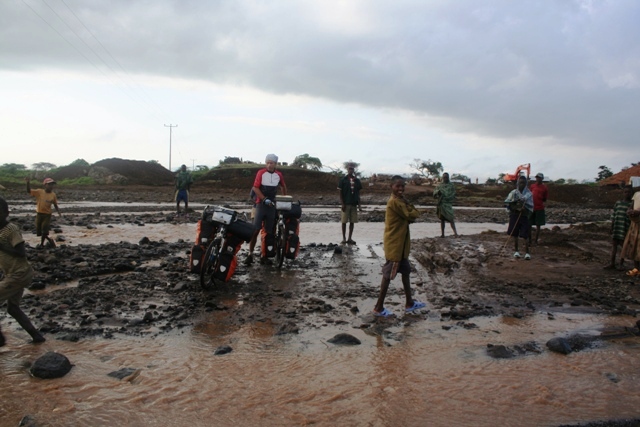 The
track leaving Dimeka really was in horrific condition and we didn't
regret our decision to bounce along in the back of the pick-up to
Konso. From Konso there was an intermittently paved road to southern
Ethiopia's main town, Arba Minch. We still had to cross quite a
few streambeds, but now a much more serious concern was the
hysterical gangs of children. These stone wielding, stick
throwing, name-calling monsters are unique to rural Ethiopia. We'd been
warned. The first groups we met up with were fairly tame.
They chanted 'highland, highland, highland' and 'give me money'
as they chased us through their village and a good distance beyond.
Highland is the name of the local mineral water and they were
after the bottles, their requests for money don't require explanation. Later we met up with boys who threw stones and
cow dung and one who even flung his long herding stick at us. Thankfully
he missed and we decided to keep the stick as we found it quite useful
for scaring off any mischievous children who might attempt to grab on
to us or our bags as we passed. To you readers that surely sounds like
a rather extreme measure to take against innocent children. I
assure you it is not. Sympathetic Ethiopian adults who have seen
us surrounded by these mobs of kids often scare them off with sticks or
by throwing buckets of water at them. Friendly greetings and
cheerful waves just don't work in some parts of Ethiopia.
The
track leaving Dimeka really was in horrific condition and we didn't
regret our decision to bounce along in the back of the pick-up to
Konso. From Konso there was an intermittently paved road to southern
Ethiopia's main town, Arba Minch. We still had to cross quite a
few streambeds, but now a much more serious concern was the
hysterical gangs of children. These stone wielding, stick
throwing, name-calling monsters are unique to rural Ethiopia. We'd been
warned. The first groups we met up with were fairly tame.
They chanted 'highland, highland, highland' and 'give me money'
as they chased us through their village and a good distance beyond.
Highland is the name of the local mineral water and they were
after the bottles, their requests for money don't require explanation. Later we met up with boys who threw stones and
cow dung and one who even flung his long herding stick at us. Thankfully
he missed and we decided to keep the stick as we found it quite useful
for scaring off any mischievous children who might attempt to grab on
to us or our bags as we passed. To you readers that surely sounds like
a rather extreme measure to take against innocent children. I
assure you it is not. Sympathetic Ethiopian adults who have seen
us surrounded by these mobs of kids often scare them off with sticks or
by throwing buckets of water at them. Friendly greetings and
cheerful waves just don't work in some parts of Ethiopia.What is strangest of all, is that we can never predict when the kids will be aggressive. We might spend the entire day being greeted by friendly faces and smiling children and then for some odd reason stumble upon a village of miniature tyrants. Our strategy is to stay alert at all times.
As we approached one village about midway between Konso and Arba Minch we began seeing an unusual number of armed men. Most were carrying what looked to be rifles that were relics of the second world war, some had imposing spears that they were busy sharpening and a few were fiddling with their AK-47s. A forbidding silence hung heavily in the air. Something was definitely up.
We kept our heads down and picked up the pace. In the next village a few kilometers further on, the scene repeated itself. Very strange indeed. But what was even stranger was the fact that traffic seemed to be moving as usual and there were no police or military in sight. Finally, I flagged down a passing vehicle and asked for an explanation of what was happening. 'Inter-community conflict', I was told. It turns out rival villages are fighting over land rights and the conflict had turned bloody. Apparently 38 people had been killed in the previous day's clashes. No one we spoke with in neighboring villages was expecting the police or military to intervene. It seemed the general consensus was that the communities should sort the matter out themselves.
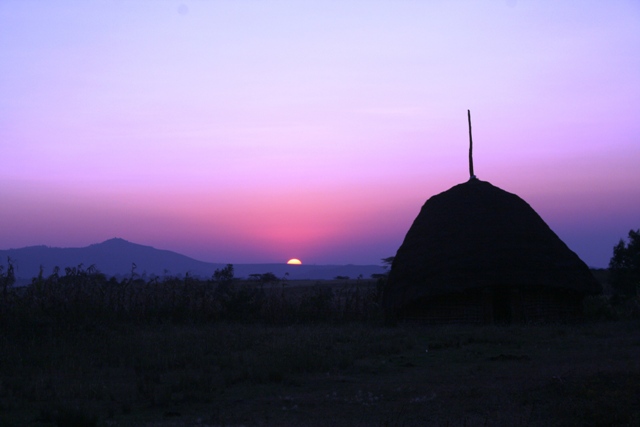
It was a tense ride and we were somewhat relieved to reach the safety and civilization of Arba Minch. After spending five restful days at the town's peaceful Catholic Mission, we headed north through Ethiopia's vast central plateau towards the capital, Addis Ababa. With altitudes ranging between 1,800 and 2,400 meters, we were in for some tough climbs. The landscape was stunning, the hills having turned emerald green after the recent rains and the traditional bell shaped huts set beautifully amongst tidy garden plots. The roads were now paved and crowded with villagers, rickety donkey carts, cows, sheep and goats, but thankfully few buses and lorries. Hats, gloves and three layers of clothing were a must as we set off in the early morning chill, but by mid-day the sun was shining brightly and the weather was perfect for cycling. Those climbs took their toll, and we arrived in Addis after five days instead of the planned four.
Our latest challenge is a bureaucratic one: obtaining visas for Sudan. There are numerous hoops to be jumped through, fickle officials whose fragile egos need to be stroked and the usual photos, photocopies and forms that need to be assembled. Wish us luck!
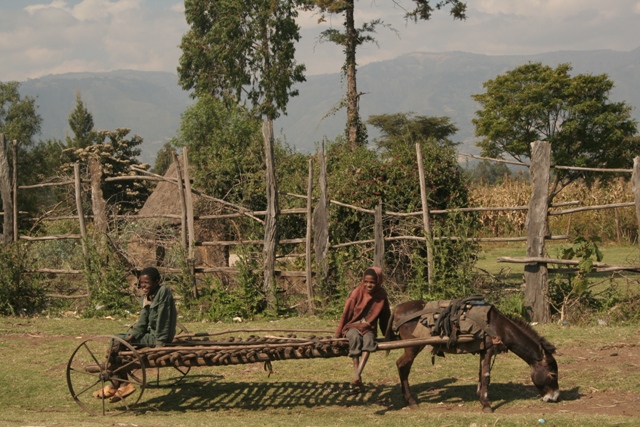
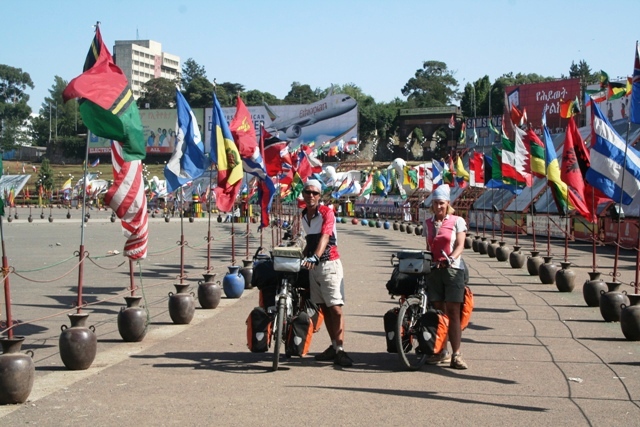
contact us at: worldbiking@gmail.com
Support our chosen charity and help educate girls in Africa-more info here

